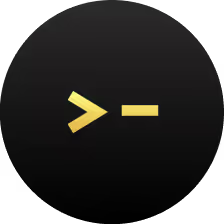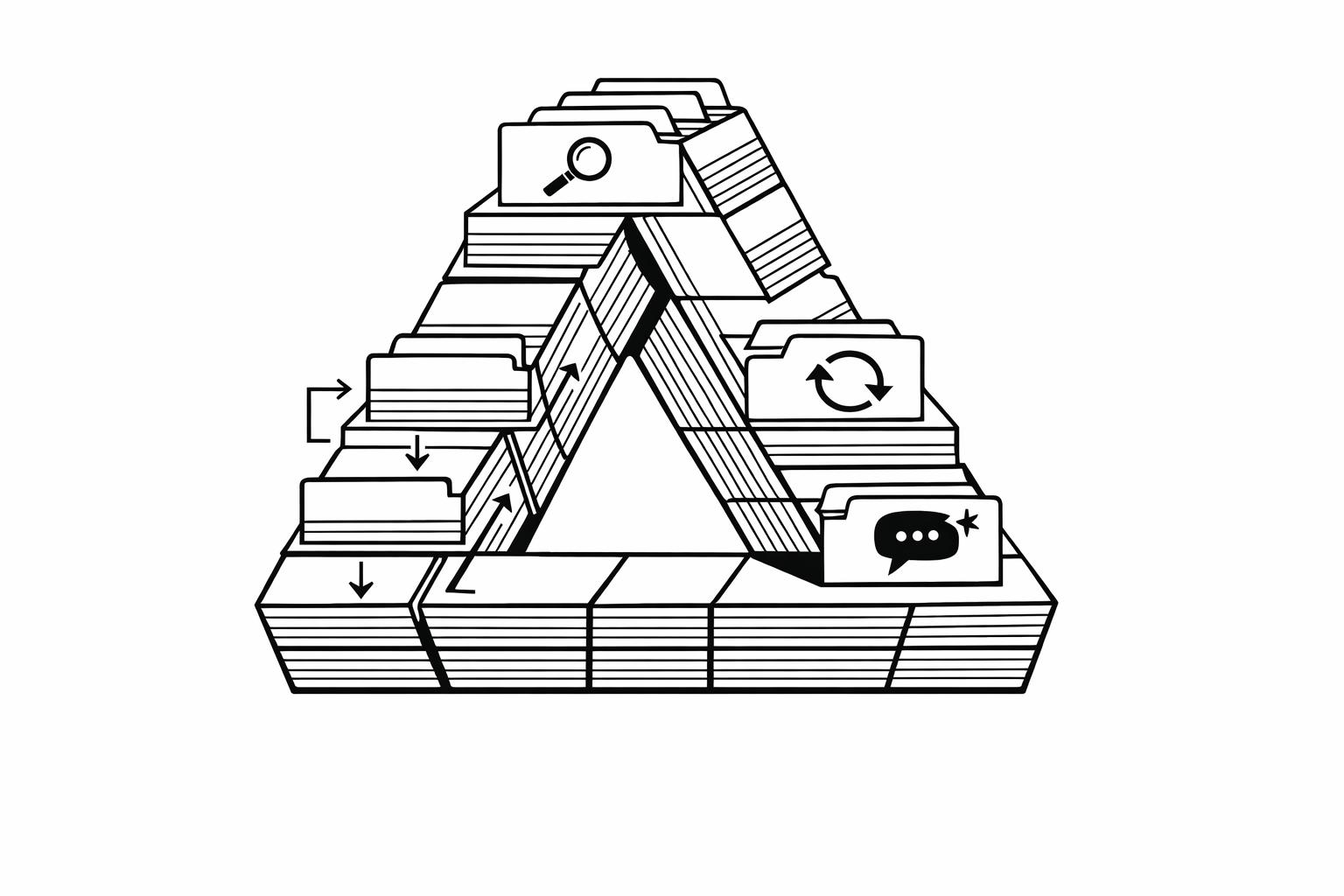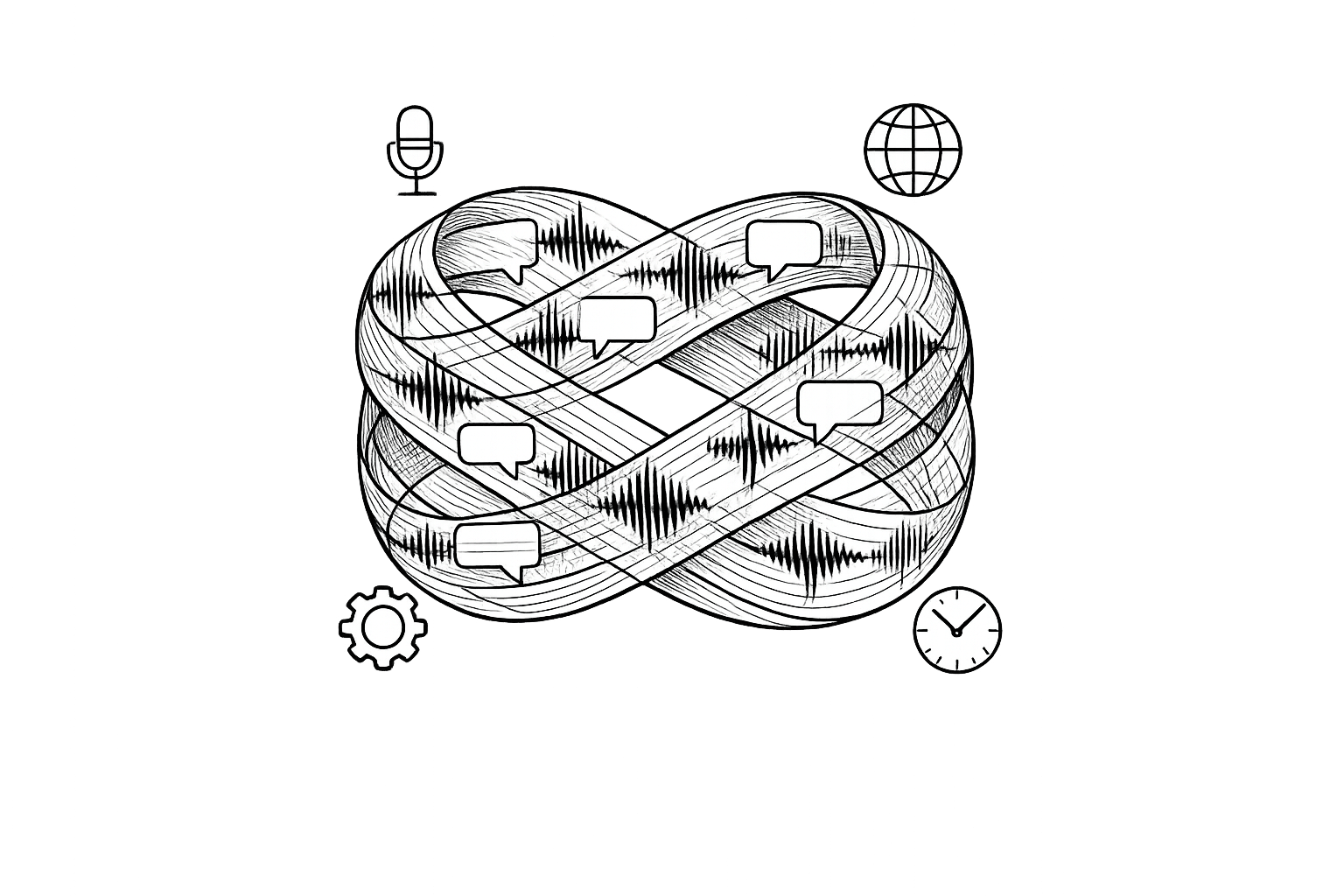Top AI Tools for Industry-Specific Workflow Automation
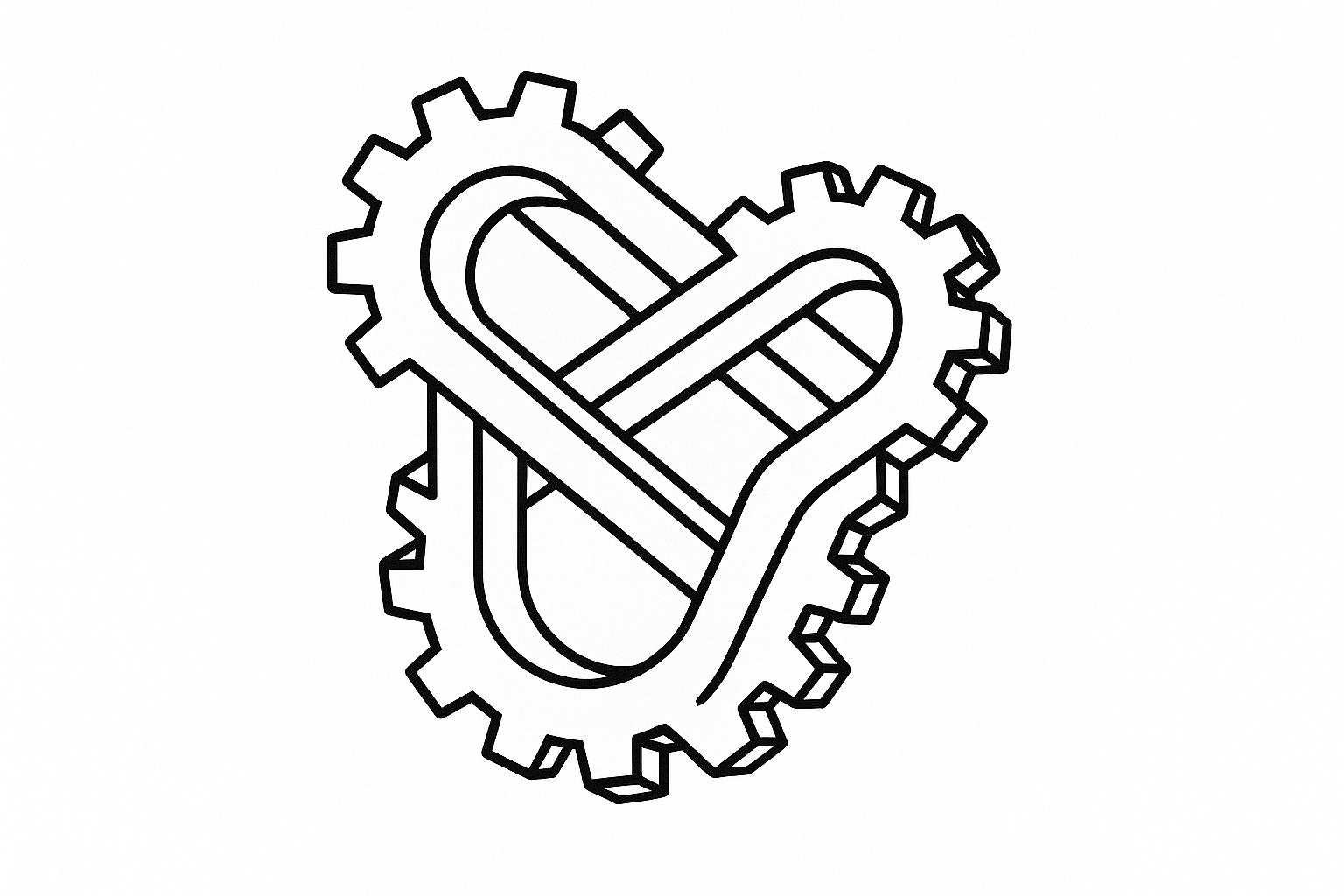
AI is transforming how industries handle workflows by automating repetitive tasks and optimizing decision-making. However, generic tools often fail to meet the unique demands of specific sectors like finance, education, and manufacturing. This article highlights five AI tools designed to address industry-specific needs:
- God of Prompt: Offers over 30,000 pre-built AI prompts for tools like ChatGPT and Midjourney, tailored to industries like sales, education, and design. Lifetime access starts at $37.
- UiPath: Focused on robotic process automation (RPA) for enterprises, handling tasks like compliance reporting and supply chain management. Starting at $420/month per user.
- IBM Watson Orchestrate: Uses conversational AI to automate workflows across industries such as healthcare and retail. Pricing is customized.
- Microsoft Power Automate: A low-code tool that integrates with Microsoft 365 and third-party apps, starting at $15/month per user.
- Zapier: Connects over 6,000 apps for simple automations, with free and paid plans starting at $19.99/month.
Each tool caters to different budgets, technical skills, and scalability needs, making it essential to choose based on your industry and workflow requirements.
Best AI Automation Platform 2025: Agency Owner's Pick
Quick Comparison
| Tool | Best For | Starting Price | Key Features | Limitations |
|---|---|---|---|---|
| God of Prompt | AI prompt optimization | Free (Premium $37) | 30,000+ prompts, lifetime access | Requires existing AI tools |
| UiPath | Enterprise RPA | $420/month per user | Advanced automation, enterprise-grade security | High cost, steep learning curve |
| IBM Watson Orchestrate | AI-driven workflows | Custom pricing | Conversational AI, industry templates | Complex setup, IBM dependency |
| Microsoft Power Automate | Microsoft 365 integration | $15/month per user | Low-code design, 400+ app integrations | Limited outside Microsoft tools |
| Zapier | App connectivity | Free (Paid $19.99/month) | 6,000+ app integrations, no coding required | Task limits, costs rise with heavy use |
This breakdown ensures you can find the right tool to streamline your workflows effectively.
1. God of Prompt
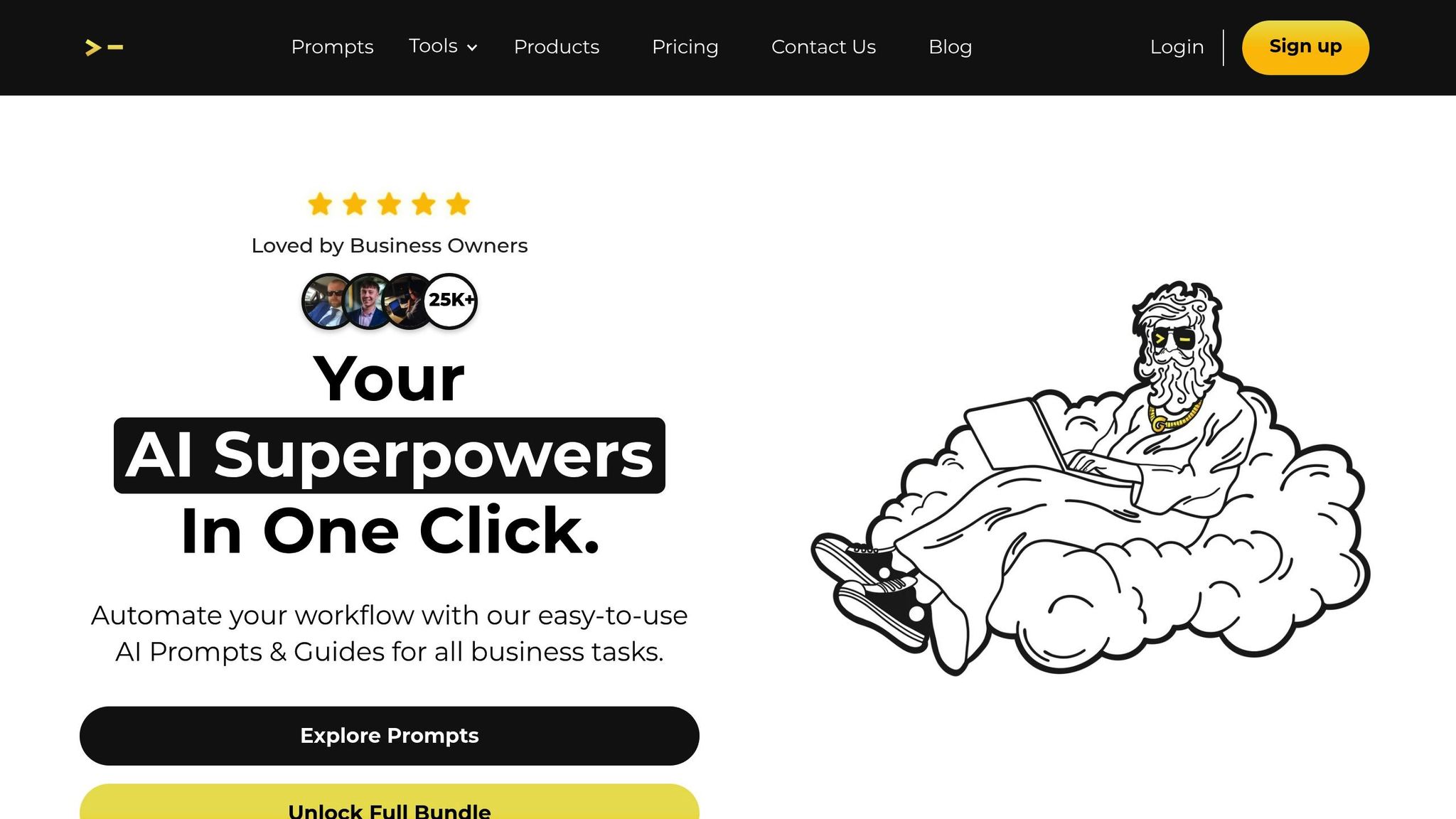
In the ever-evolving world of AI-driven workflow automation, God of Prompt stands out as a solution designed to tackle industry-specific challenges head-on. With a library of over 30,000 AI prompts for tools like ChatGPT, Claude, Midjourney, and Gemini AI, it has already earned the trust of 17,060+ customers, boasting an impressive 4.9/5 rating on Trustpilot.
Verified customer Rajeev Aggarwal shares, "God of Prompt's products are great value for money!".
Let’s dive into its standout features: customization for specific industries, seamless integration, scalability, and pricing.
Tailored Solutions for Every Industry
God of Prompt doesn’t rely on one-size-fits-all solutions. Instead, it offers specialized prompt collections tailored to key business functions like sales, marketing, SEO, education, and operations. Each pack includes 200+ prompts that address the unique needs of specific workflows.
For instance:
- The Education Pack simplifies tasks like curriculum planning and student assessments.
- The Sales Pack focuses on streamlining lead qualification and pipeline management.
- For visual content creators, Midjourney-specific packs include 1,500–2,000+ prompts for web design, architecture, marketing visuals, and photography.
This industry-specific approach ensures businesses can address their unique challenges while maintaining efficiency.
Easy Integration with Existing Tools
God of Prompt works seamlessly with popular AI platforms such as ChatGPT, Claude, Midjourney, and Gemini AI. Instead of requiring users to adopt new software, it enhances the capabilities of tools they already use.
All content is managed through Notion, making it simple for teams to organize, search, and collaborate on prompts. Plus, each collection includes detailed guides and tips, helping users customize prompts for their evolving workflows.
Scalable for Any Business Size
Whether you’re a solo entrepreneur or part of a large enterprise, God of Prompt adapts to meet your needs. Individuals can start with targeted packs, while larger businesses can opt for comprehensive bundles.
The platform claims users can "Save 20 hours per week just by using God of Prompt's cutting-edge products". This is particularly appealing for small teams aiming to maximize productivity.
Customer Dol "Canes" highlights its impact: "The quality of the prompt models is simply exceptional... This tool has saved me an immense amount of time in my business, marketing, and prompt engineering tasks".
Feedback like this demonstrates how God of Prompt delivers meaningful productivity gains for businesses of any size.
Pricing That Delivers Lifetime Value (in USD)
God of Prompt uses a one-time payment model, giving users lifetime access with no recurring subscription fees. Here’s a breakdown of its pricing:
- Free Tier: Includes 1,000+ ChatGPT prompts and 100 Midjourney prompts.
- Individual Packs: Business collections are priced at $37.00, while creative Midjourney packs cost $27.00.
- Plus ChatGPT Bundle: Offers 2,000+ mega-prompts for $97.00.
- Plus Midjourney Bundle: Includes 10,000+ visual prompts for $67.00.
- MAX Complete AI Bundle: For $150.00, users get access to all 30,000+ prompts, unlimited custom prompts, and lifetime updates.
Every purchase comes with a 7-day risk-free guarantee, ensuring customers can explore the platform with full refund protection if they’re not satisfied.
2. UiPath
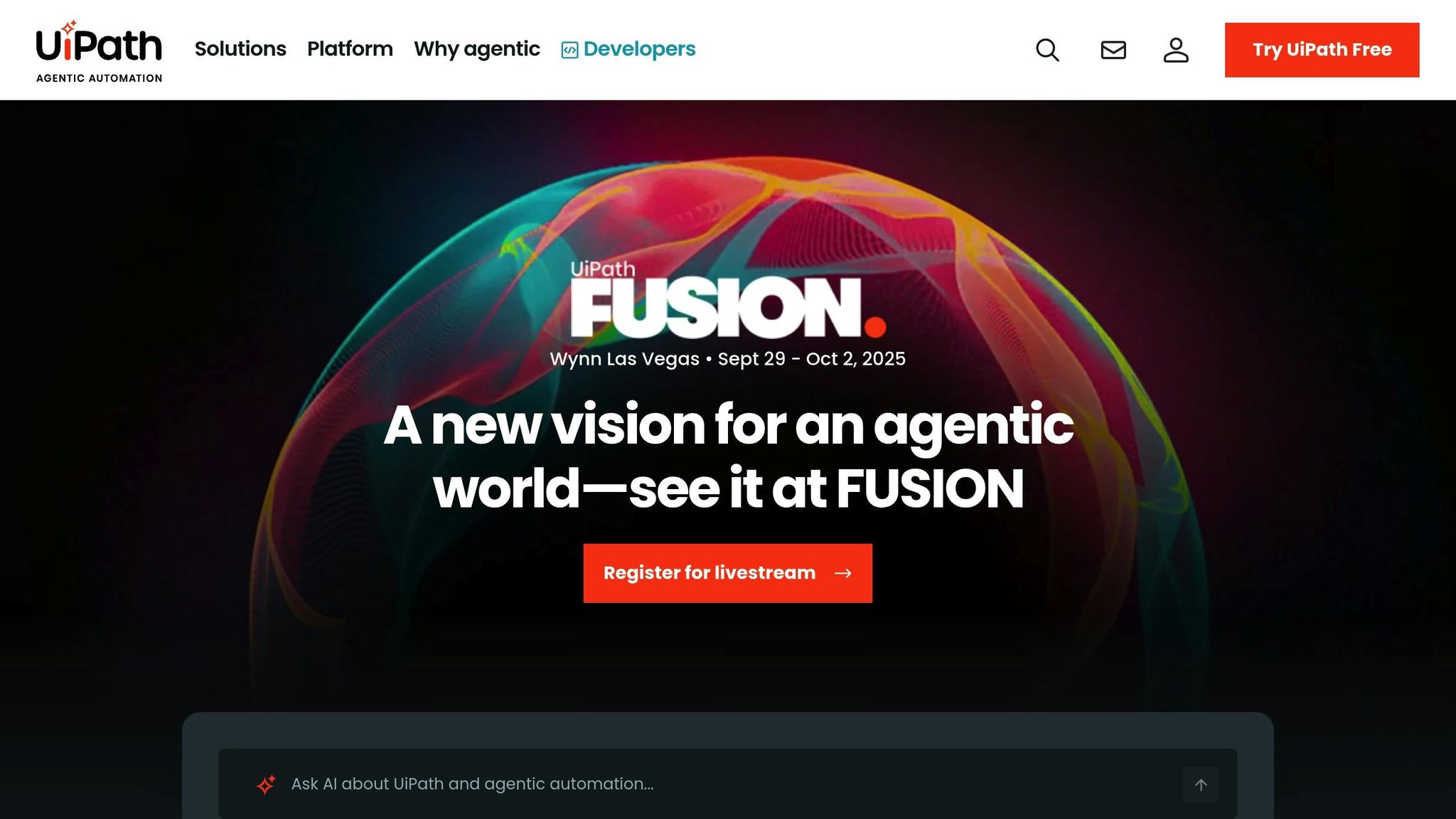
Building on the specialized capabilities of tools like God of Prompt, UiPath takes automation a step further by combining powerful robotic process automation (RPA) with advanced AI. As one of the leading RPA platforms, UiPath simplifies repetitive tasks and enhances productivity through intelligent automation.
Industry-Specific Automation Solutions
UiPath stands out for its ability to deliver customized automation tailored to specific industries. With a library of pre-built templates and bots designed for various sectors, the platform addresses the unique needs of industries like healthcare, financial services, manufacturing, retail, and government.
For example, in healthcare, UiPath automates tasks such as patient data entry, insurance claim processing, and appointment scheduling. In financial services, it handles loan processing, compliance reporting, and fraud detection. Manufacturing operations benefit from automation in areas like supply chain management, quality control documentation, and inventory tracking. This targeted approach highlights the importance of aligning automation with industry-specific challenges to streamline workflows effectively.
Additionally, UiPath's AI-powered Computer Vision technology allows seamless integration with older, legacy systems that lack modern APIs. This eliminates the need for costly system upgrades, enabling businesses to automate processes while maintaining their existing software.
Seamless Integration with Business Systems
UiPath integrates effortlessly with popular business applications like SAP, Salesforce, Microsoft Office 365, Oracle, and ServiceNow. By connecting these systems, it ensures smooth data flow and minimizes manual intervention. The platform also supports major cloud providers, including AWS, Microsoft Azure, and Google Cloud Platform, giving businesses the flexibility to enhance automation without disrupting their current infrastructure.
The UiPath Orchestrator acts as a central hub for managing automation across an organization. It enables IT teams to deploy, monitor, and oversee automation processes while providing real-time analytics and performance insights. These features help businesses track efficiency and uncover opportunities for further improvement.
Flexible Scalability for All Business Sizes
UiPath caters to organizations of all sizes, offering deployment options in the cloud, on-premises, or as a hybrid solution.
Smaller businesses can explore automation with the UiPath Community Edition, which provides free access to essential tools, making it a cost-effective starting point. Larger enterprises benefit from advanced security features like role-based access controls, audit trails, and compliance with industry standards. The platform's scalability allows companies to manage extensive automation projects across multiple departments with ease.
Cost-Effectiveness and ROI
UiPath uses a subscription-based pricing model for both attended and unattended automation, delivering measurable value through reduced labor costs and greater efficiency. Many organizations report seeing a quick return on investment as automation reduces manual effort and boosts productivity. This combination of affordability and performance makes UiPath a compelling choice for businesses seeking to expand their automation capabilities.
3. IBM Watson Orchestrate
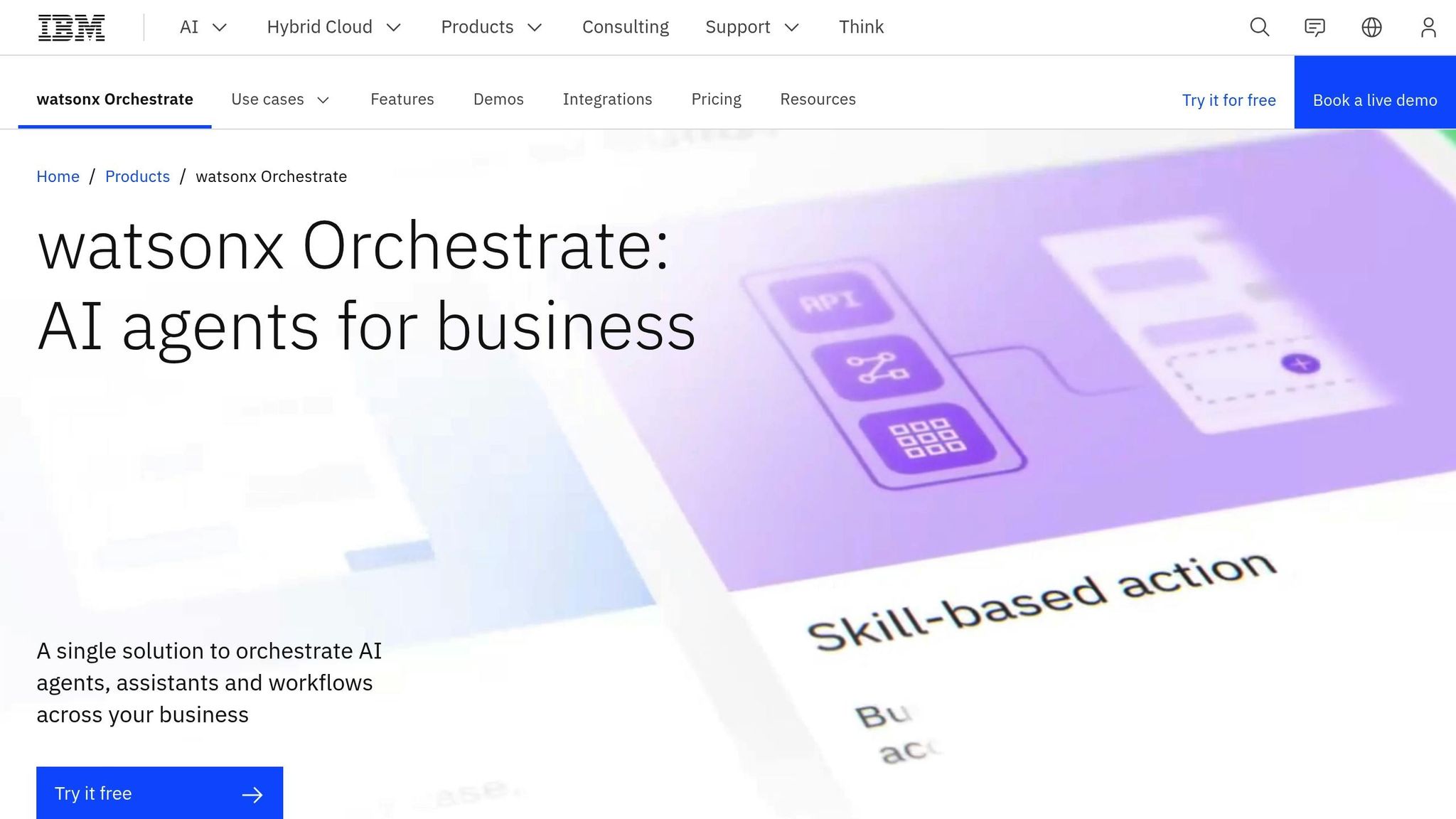
IBM Watson Orchestrate leverages conversational AI to help users automate workflows using natural language. This eliminates the need for technical expertise, making automation more accessible to a broader audience.
By connecting various applications into seamless workflows, the platform simplifies complex processes, allowing businesses to create tailored solutions for their specific needs.
Industry-Specific Customization
Watson Orchestrate is built to meet the unique demands of different industries. With its flexible set of pre-built skills and industry-focused templates, it can adapt to a wide range of use cases. For instance:
- Financial Services: Automate tasks like credit risk assessments, regulatory reporting, and customer onboarding.
- Healthcare: Manage patient scheduling, insurance verification, and medical record handling.
- Human Resources: Streamline processes such as employee onboarding, performance review scheduling, and benefits enrollment.
- Retail: Enhance operations with workflows for inventory management and customer support.
Each implementation can be customized to align with industry-specific regulations and best practices, ensuring compliance and efficiency.
Integration with Existing Systems
Watson Orchestrate integrates seamlessly with popular business applications like Salesforce, ServiceNow, Slack, Microsoft Teams, Box, and Workday. Using APIs and webhooks, it connects software in real time, ensuring data consistency while reducing the need for manual updates.
The platform also works alongside IBM's broader AI tools, such as Watson Discovery for document analysis and Watson Assistant for conversational interactions. It supports hybrid and multi-cloud environments, including AWS, Microsoft Azure, Google Cloud Platform, and on-premises setups.
To meet enterprise security standards, Watson Orchestrate includes features like end-to-end encryption, role-based access controls, and audit logging. Integration with identity management systems ensures secure and consistent user authentication, making it a reliable choice for sensitive workflows.
Scalability Across Business Sizes
Designed to accommodate businesses of all sizes, Watson Orchestrate offers flexible deployment options. Its consumption-based pricing model allows companies to start small and expand as their needs grow.
- Small and Medium-Sized Enterprises: Quickly implement basic automation workflows.
- Larger Organizations: Take advantage of advanced features like custom skill development, enhanced security, and dedicated support.
The platform automatically adjusts computing resources based on workflow demands, ensuring smooth performance even during peak usage.
Pricing and Value for Money
IBM Watson Orchestrate operates on a consumption-based pricing model, which adjusts with usage. While pricing depends on factors like customization, integration complexity, and support needs, many organizations have reported significant reductions in manual processing time and overall productivity gains. Optional professional services are available to further tailor the platform to an organization’s specific requirements.
sbb-itb-58f115e
4. Microsoft Power Automate
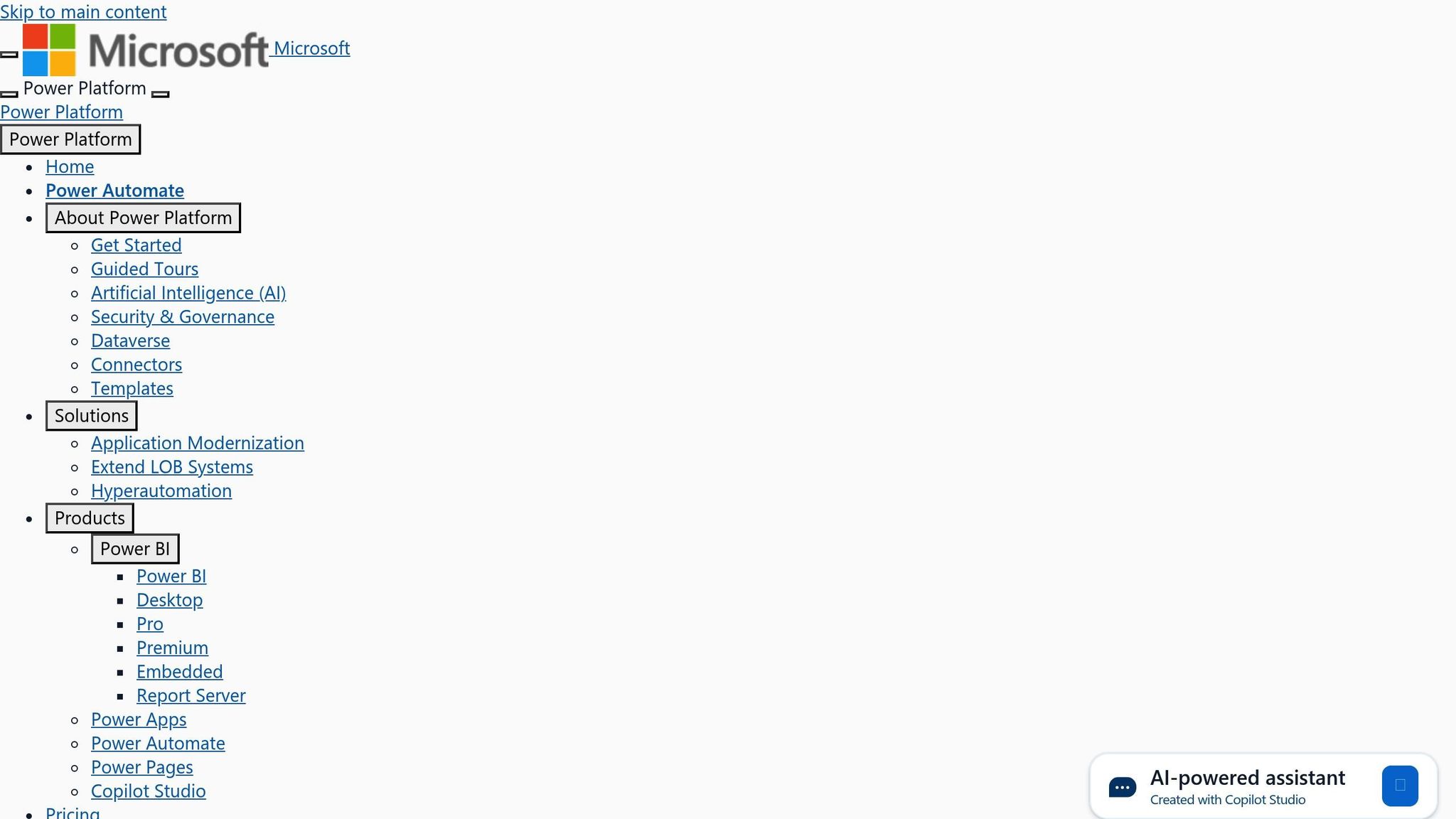
Microsoft Power Automate stands out as a cloud-based tool designed to simplify and streamline repetitive tasks. With its low-code/no-code framework, it empowers users to automate workflows efficiently. What makes it even more appealing is its ability to connect over 400 apps, including both Microsoft's own suite and third-party platforms like Salesforce, Twitter, and Google Workspace. This versatility makes it a great fit for businesses juggling multiple tools and systems.
Tailored Solutions for Different Industries
One of Power Automate's strengths is its ability to cater to the specific needs of various industries. By offering specialized templates and connectors, it addresses the unique challenges and compliance standards of different sectors.
- Financial Services: Automates tasks like compliance reporting, loan processing, fraud detection, and streamlining KYC during customer onboarding.
- Manufacturing: Enhances supply chain management, quality control, and maintenance scheduling by integrating with IoT and ERP systems.
- Healthcare: Manages appointment scheduling, insurance verification, and HIPAA-compliant data handling.
- Education: Simplifies processes like student enrollment, grade reporting, and campus-wide notifications.
Seamless Integration with Existing Tools
Power Automate integrates effortlessly with Microsoft's ecosystem, including Microsoft 365 (SharePoint, Teams, Outlook, Excel) and Dynamics 365 for CRM workflows. Additionally, its support for REST APIs, webhooks, and on-premises data gateways ensures compatibility with older, legacy systems, enabling secure and smooth integration.
Scalable for All Business Sizes
Whether you're a small business or a large enterprise, Power Automate offers scalable solutions. Small businesses can leverage simple workflows through Microsoft 365 subscriptions, while enterprises benefit from advanced features like dedicated resources, centralized management, and real-time analytics to handle complex processes.
Affordable Pricing Options
Pricing begins at $15.00 per user per month, which includes unlimited flows and access to premium connectors. For businesses focused on system-to-system integrations, there’s a per-flow option starting at $100.00 per month. Many users have noted substantial returns on investment, particularly through reduced processing times and improved efficiency.
5. Zapier
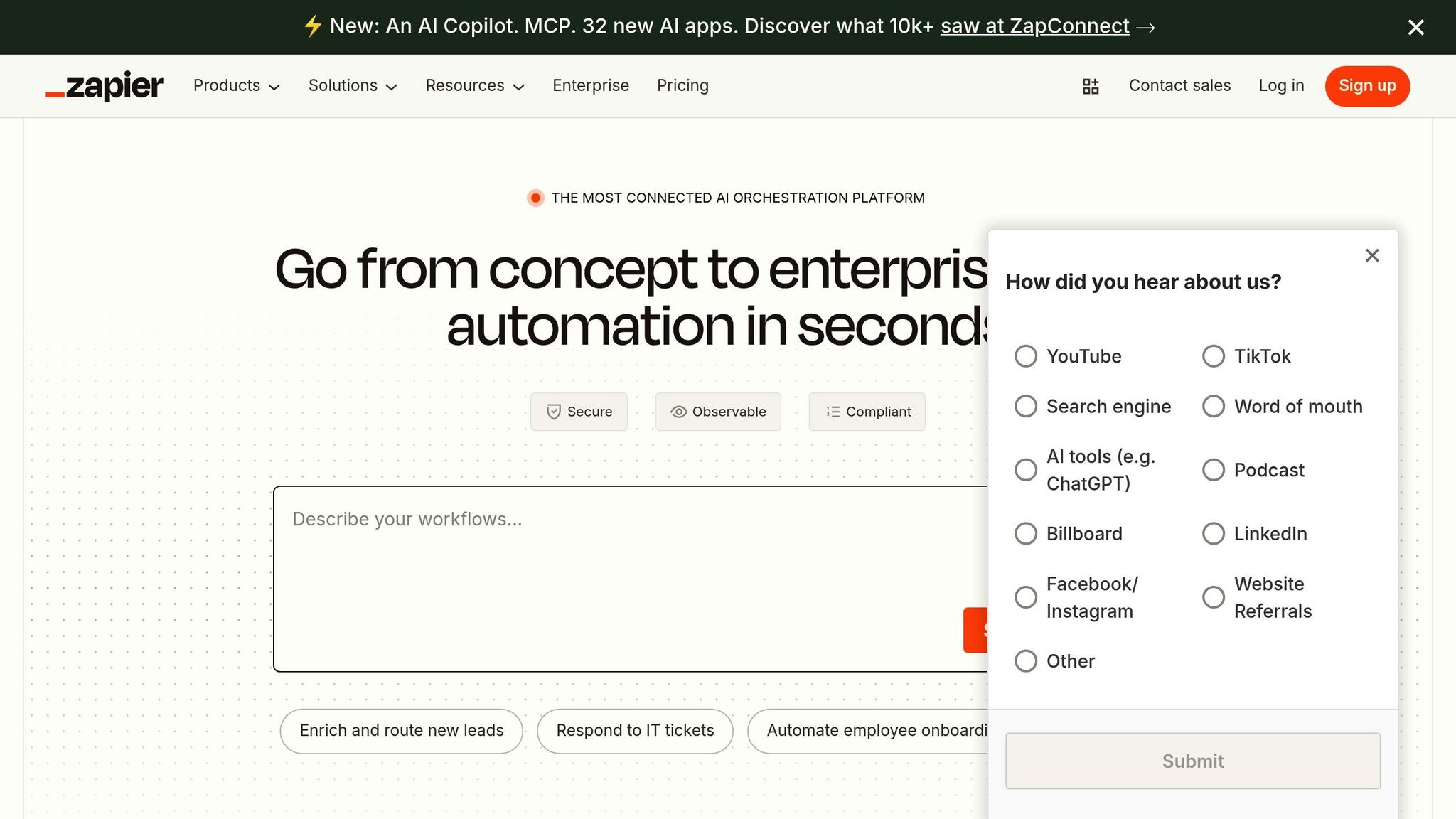
Zapier stands out by making app connections effortless, requiring no coding knowledge. It simplifies the process of linking various software tools through its "Zaps", which are easy-to-set-up workflows. This straightforward approach makes Zapier a go-to solution for businesses looking for quick and efficient automation, perfectly complementing the tailored strategies we've discussed earlier.
Tailored Solutions for Different Industries
One of Zapier's biggest strengths is its massive app ecosystem, supporting over 6,000 apps. This allows businesses across industries to build highly specific automations.
For example, real estate agencies use Zapier to automatically send lead details from Facebook Lead Ads into CRM systems like HubSpot or Salesforce. From there, follow-up email sequences can be triggered through tools like Mailchimp. E-commerce companies rely on Zapier to sync Shopify order data with accounting software like QuickBooks while simultaneously updating inventory across multiple platforms.
Marketing agencies also benefit greatly. They can connect social media tools with reporting platforms, automating tasks like logging Instagram engagement data into Google Sheets or sending performance updates to Slack when a post hits a specific milestone. These targeted automations highlight Zapier's ability to integrate seamlessly into diverse workflows.
Seamless Integration with Existing Systems
Zapier's multi-step Zaps enable businesses to handle more complex processes by connecting multiple apps in a single workflow. It shines in cloud-based integrations but also supports custom and legacy systems through webhook functionality. This means businesses can link older systems with modern tools without needing direct integrations.
The platform also supports conditional logic, allowing users to design workflows that respond to specific triggers. For instance, you can create "if this, then that" scenarios to ensure tasks are carried out based on certain conditions. These features make it easier for businesses to scale their automation efforts, regardless of size or complexity.
Flexibility for Businesses of All Sizes
Zapier is designed to grow alongside your business. Solo entrepreneurs can start with simple two-step Zaps, such as saving Gmail attachments to Google Drive or creating Trello cards from new form submissions.
As businesses expand, Zapier's multi-step Zaps and team management features become invaluable. Larger teams can share workflows across departments while maintaining control over access and security. Its task-based pricing ensures businesses only pay for what they use, making it a budget-friendly option for companies with fluctuating automation needs.
Pricing Options
Zapier offers a range of pricing plans to suit different needs.
- Free Tier: Includes 100 tasks per month and basic two-step Zaps.
- Starter Plan: $19.99 per month for 750 tasks, ideal for small-scale automation.
- Professional Plan: $49.00 per month for 2,000 tasks, plus access to premium apps and multi-step Zaps.
- Team Plan: $69.00 per month, offering 50,000 tasks, shared team folders, and priority support.
With its task-based pricing, Zapier ensures businesses only pay for the automation they use. This is especially helpful for companies dealing with seasonal workflows or varying levels of activity.
Tool Comparison Chart
Choosing the right AI automation tool depends on your industry needs, budget, and technical requirements. The table below outlines the key features and drawbacks of popular platforms, helping you make a well-informed choice.
| Tool | Best For | Starting Price | Key Strengths | Main Limitations |
|---|---|---|---|---|
| God of Prompt | AI prompt optimization & workflows | Free (Premium from $37.00) | 30,000+ AI prompts, lifetime updates, multi-platform support | Requires existing AI tools to unlock full value |
| UiPath | Enterprise RPA & complex automation | $420/month per user | Advanced bot capabilities, enterprise-grade security | High cost, steep learning curve |
| IBM Watson Orchestrate | AI-powered decision-making | Custom pricing | Enterprise AI integration, cognitive automation | Complex setup, IBM ecosystem dependency |
| Microsoft Power Automate | Microsoft ecosystem integration | $15/month per user | Seamless Office 365 integration, user-friendly design | Limited functionality outside Microsoft tools |
| Zapier | App connectivity & simple workflows | Free (Paid from $19.99/month) | 6,000+ app integrations, no-code setup | Task limits, costs can increase with heavy use |
The table summarizes the platforms' core features. Below, we dive into pricing, scalability, technical needs, and integration options to help you narrow down your choice.
For budget-conscious users, God of Prompt and Zapier's free plans are standout options. God of Prompt’s Complete AI Bundle, priced at $150, offers lifetime access to its resources, making it a one-time investment for long-term benefits. Zapier’s free tier, which includes 100 tasks per month, is perfect for testing basic automation without upfront costs.
On the other hand, enterprise-level organizations often lean toward UiPath or IBM Watson Orchestrate despite their higher price tags. UiPath starts at $420 per user each month, but its advanced robotic process automation (RPA) is ideal for industries like manufacturing or finance. IBM Watson Orchestrate shines in scenarios requiring AI-driven decision-making but demands a significant commitment to the IBM ecosystem.
For small to medium businesses, Microsoft Power Automate and Zapier's paid plans strike a good balance of affordability and functionality. Power Automate costs just $15 per user monthly, making it a natural fit for companies already using Office 365. Zapier's Professional plan, at $49 per month, adds multi-step automation and expanded task limits, giving SMBs more flexibility.
The learning curve is another critical factor. God of Prompt is beginner-friendly, requiring minimal technical skills to optimize existing AI tools. Similarly, Zapier's drag-and-drop interface makes it accessible for non-tech-savvy users. On the other hand, UiPath and IBM Watson Orchestrate demand advanced technical expertise or dedicated IT teams to implement effectively.
When it comes to scalability, the platforms vary widely. Zapier’s task-based pricing can become costly with high usage, potentially reaching hundreds of dollars per month. Conversely, God of Prompt’s lifetime pricing eliminates recurring costs, while enterprise solutions like UiPath offer virtually limitless automation potential within their licensing agreements.
Lastly, integration capabilities play a major role in platform selection. Zapier supports over 6,000 apps, making it ideal for businesses with varied software stacks. Microsoft Power Automate excels within the Office 365 ecosystem but has limited compatibility with non-Microsoft tools. Meanwhile, God of Prompt works seamlessly across multiple AI platforms like ChatGPT, Claude, Midjourney, and Gemini AI, offering unmatched flexibility.
These insights provide a solid foundation for choosing the right tool to meet your unique workflow and industry requirements.
Conclusion
When selecting an AI tool, it’s important to consider how well it aligns with your workflow, budget, and technical needs. True workflow automation doesn’t just connect apps - it refines how AI systems communicate and collaborate.
God of Prompt takes AI communication to the next level with a library of over 30,000 expertly crafted prompts designed for platforms like ChatGPT, Claude, Midjourney, and Gemini AI. With the Complete AI Bundle, you gain lifetime access to categorized prompt libraries tailored for various industries and use cases. Whether it’s automating customer service in retail, drafting technical documents for manufacturing, or creating personalized learning materials in education, these optimized prompts ensure consistent, high-quality AI outputs.
What sets God of Prompt apart is its cross-platform compatibility, allowing it to work seamlessly across multiple AI platforms. This flexibility ensures you can adapt as new technologies emerge. Plus, with lifetime updates, your prompt library evolves alongside advancements in AI, keeping you ahead of the curve. Unlike tools that tie you to specific ecosystems, these prompts offer universal usability.
To achieve successful workflow automation, it’s essential to combine the right tools with optimized AI interactions. Platforms like Zapier handle the technical connections, while God of Prompt ensures your AI outputs are accurate, effective, and customized to meet your industry’s needs. This balanced approach - pairing robust automation tools with fine-tuned AI prompts - can transform how industries streamline their workflows and achieve their goals.
FAQs
How does God of Prompt work with AI tools to improve workflows for specific industries?
God of Prompt transforms workflows across various industries with an impressive library of over 30,000 expertly crafted AI prompts, guides, and toolkits. Designed for platforms such as ChatGPT, Claude, Midjourney, and Gemini, these resources empower users to fine-tune tasks like automation, personalization, and data analysis with ease.
By integrating effortlessly with existing AI tools, God of Prompt takes the complexity out of processes in fields like marketing, SEO, and product management. Its ready-made prompts and workflows allow businesses to simplify operations, improve efficiency, and deliver stronger results.
What should you consider when selecting an AI tool for automating workflows in your industry?
When choosing an AI tool for automating workflows in your specific industry, focus on how well it integrates with your current systems and whether it can grow alongside your business. Tools that have a solid history of success in your field - backed by case studies or testimonials - are worth prioritizing.
Evaluate whether the tool can handle the level of complexity your operations demand, whether that's managing straightforward tasks or tackling more intricate processes. Make sure it aligns with industry regulations, supports accurate and reliable data, and provides a way to test its capabilities before committing to full deployment. These considerations will guide you toward a solution that improves efficiency while addressing your business's unique needs.
How does God of Prompt’s lifetime pricing compare to subscription-based models for long-term value?
God of Prompt offers a lifetime pricing model that grants access to an extensive library of over 30,000 AI prompts, guides, and updates - all for a single, upfront payment. This approach eliminates the need for recurring fees, making it a one-time investment for users who prefer ongoing access to resources without the hassle of monthly or yearly charges.
On the other hand, subscription-based models typically involve regular payments, which can accumulate over time. However, they often come with perks like continuous updates and dedicated customer support. For those looking to avoid recurring costs while still gaining long-term access to valuable resources, God of Prompt’s lifetime plan could be the smarter choice.

